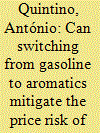|
|
|
Sort Order |
|
|
|
Items / Page
|
|
|
|
|
|
|
| Srl | Item |
| 1 |
ID:
169718


|
|
|
|
|
| Summary/Abstract |
Oil prices wide fluctuations have been a constant in energy economics, influencing heavily the profits of oil companies. Even small oil prices changes imply wide variations in the refining margins, the main economic drivers of the profits of oil companies with relevant refining assets. The future will bring an even more volatile environment as the level of implementation of low-carbon policies increases, implying a declining demand for refined products for internal combustion engine vehicles. One of the possible paths to mitigate the refining margin volatility and the decreasing demand for refined products is to switch gasoline production to aromatics products, through new aromatics plants. In this paper we apply the copula-GARCH model with Monte Carlo simulation to evaluate the economic impacts of this production switching, supporting a European oil company's decision. The results show that the product switch success depends on gasoline prices and on how the aromatics plant is built, if in stand-alone mode or integrated with the refinery. It is also shown that the desired reduction of the integrated refining margin volatility is not achieved with the product switching.
|
|
|
|
|
|
|
|
|
|
|
|
|
|
|
|
| 2 |
ID:
125539


|
|
|
|
|
| Publication |
2013.
|
| Summary/Abstract |
China is currently in the stage of industrialization and urbanization, which is characterized by rigid energy demand and rapid growth of energy consumption. Therefore, energy conservation will become a major strategy for China in a transition to low-carbon economy. China's transport industry is of high energy consumption. In 2010, oil consumption in transport industry takes up 38.2% of the country's total oil demand, of which 23.6% is taken up by road transport sector. As a result, oil saving in China's road transport sector is vital to the whole nation. The co-integration method is developed to find a long-run relationship between oil consumption and affecting factors such as GDP, road condition, labor productivity and oil price, to estimate oil demand and to predict future oil saving potential in China's transport sector under different oil-saving scenarios. Monte Carlo simulation is further used for risk analysis. Results show that under BAU condition, oil demand of China's road transport sector will reach 278.5 million ton of oil equivalents (MTOE) in 2020. Oil saving potential will be 86 MTOE and 131 MTOE under moderate oil-saving scenario and advanced oil-saving scenario, respectively. This paper provides a reference to establishing oil saving policy for China's road transport sector.
|
|
|
|
|
|
|
|
|
|
|
|
|
|
|
|
| 3 |
ID:
111344


|
|
|
|
|
| Publication |
2012.
|
| Summary/Abstract |
This paper presents a novel decision-support tool for assessing future generation portfolios in an increasingly uncertain electricity industry. The tool combines optimal generation mix concepts with Monte Carlo simulation and portfolio analysis techniques to determine expected overall industry costs, associated cost uncertainty, and expected CO2 emissions for different generation portfolio mixes. The tool can incorporate complex and correlated probability distributions for estimated future fossil-fuel costs, carbon prices, plant investment costs, and demand, including price elasticity impacts. The intent of this tool is to facilitate risk-weighted generation investment and associated policy decision-making given uncertainties facing the electricity industry. Applications of this tool are demonstrated through a case study of an electricity industry with coal, CCGT, and OCGT facing future uncertainties. Results highlight some significant generation investment challenges, including the impacts of uncertain and correlated carbon and fossil-fuel prices, the role of future demand changes in response to electricity prices, and the impact of construction cost uncertainties on capital intensive generation. The tool can incorporate virtually any type of input probability distribution, and support sophisticated risk assessments of different portfolios, including downside economic risks. It can also assess portfolios against multi-criterion objectives such as greenhouse emissions as well as overall industry costs.
|
|
|
|
|
|
|
|
|
|
|
|
|
|
|
|
| 4 |
ID:
174960


|
|
|
|
|
| Summary/Abstract |
Due to the liberalization of the electricity market, evaluation of competitor behaviors, as an uncertainty factor, is a critical information for a Generation Company (GenCo) to maximize its profit by optimizing bidding strategies. In this paper, a new bidding strategy model has been presented based on the Genetic Algorithm and a refined Monte Carlo simulation model. This process is done through the similarity function and consideration of the seasonality trend as the main characteristic of the electricity spot price. The main contributions of this paper include: (a): Consideration of the similarity value for all days in historical dates in the database, (b): Consideration of the seasonality trend of market clearing price by applying K-Means algorithm for clustering historical data based on demand, (c): Application of the proposed model for each cluster's data, (d): Performance evaluation of the fitness function of each generated strategy by a simulation model based on historical data. The proposed model has been tested for the 10 subsets of Iran's electricity market 2016. The obtained results show that the proposed model is statistically efficient, and the prediction accuracy of MCP by the proposed model can be improved by more than 25% and 11% compared with a simple simulation model and the hybrid of simulation and Q-learning model.
|
|
|
|
|
|
|
|
|
|
|
|
|
|
|
|
|
|
|
|
|